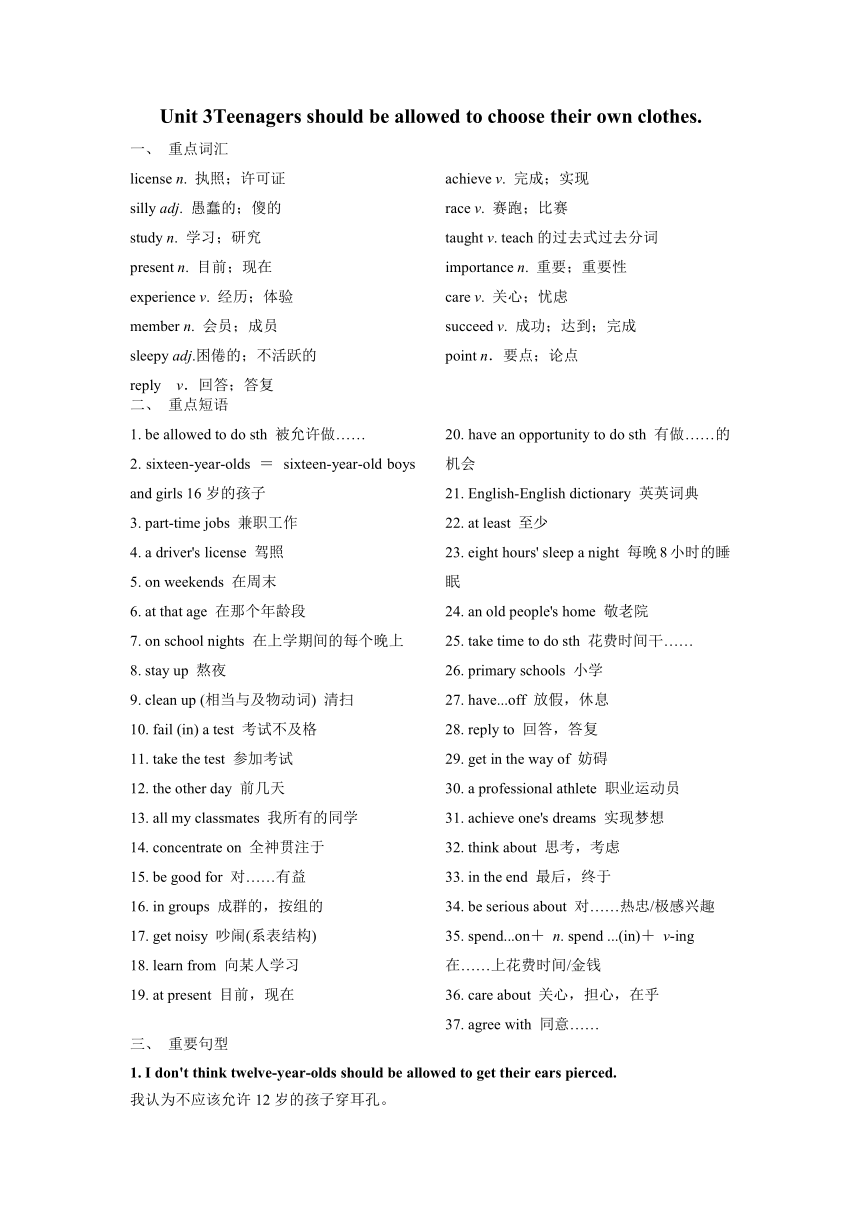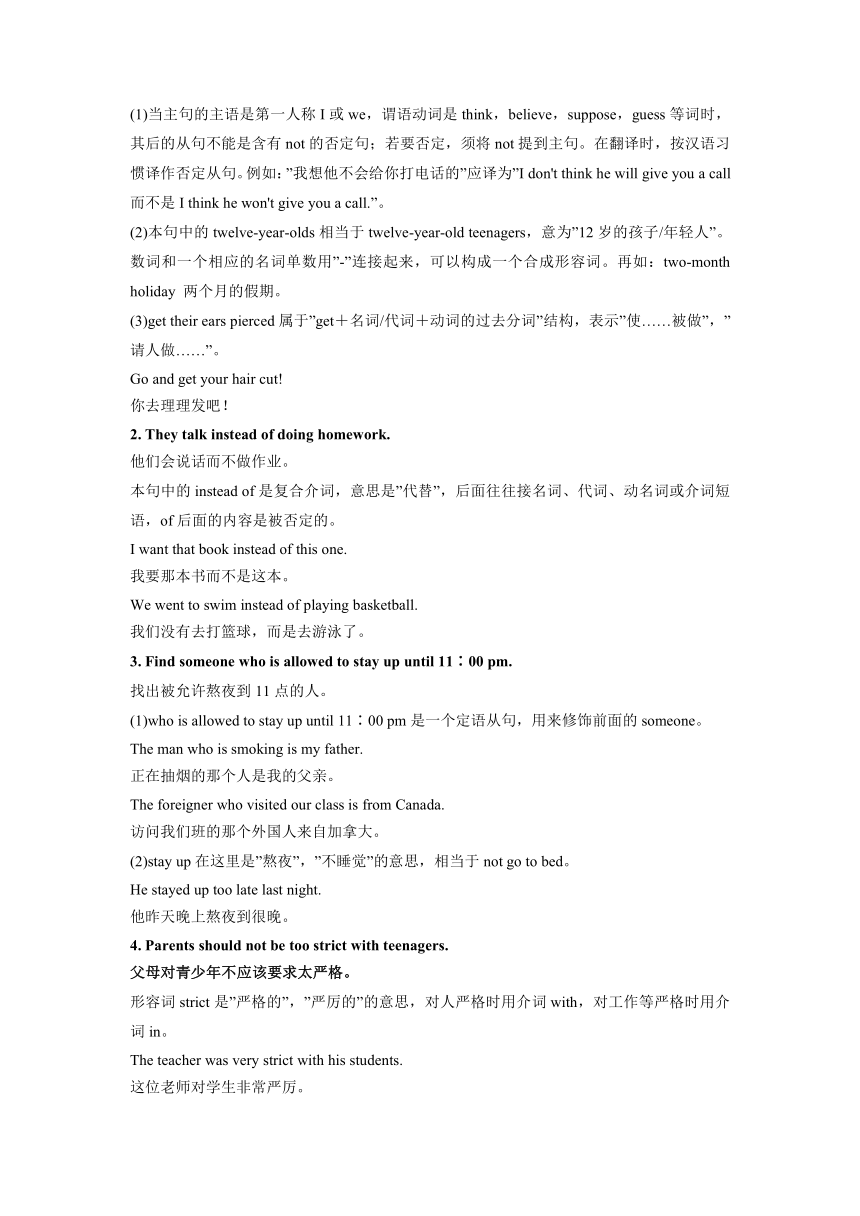Unit 3 Teenagers should be allowed to choose their own clothes.重点词汇短语及句型
文档属性
| 名称 | Unit 3 Teenagers should be allowed to choose their own clothes.重点词汇短语及句型 |

|
|
| 格式 | zip | ||
| 文件大小 | 44.4KB | ||
| 资源类型 | 教案 | ||
| 版本资源 | 人教新目标(Go for it)版 | ||
| 科目 | 英语 | ||
| 更新时间 | 2012-08-31 00:00:00 | ||
图片预览


文档简介
Unit 3Teenagers should be allowed to choose their own clothes.
一、 重点词汇
license n. 执照;许可证
silly adj. 愚蠢的;傻的
study n. 学习;研究
present n. 目前;现在
experience v. 经历;体验
member n. 会员;成员
sleepy adj.困倦的;不活跃的
reply v.回答;答复
achieve v. 完成;实现
race v. 赛跑;比赛
taught v. teach的过去式过去分词
importance n. 重要;重要性
care v. 关心;忧虑
succeed v. 成功;达到;完成
point n.要点;论点
二、 重点短语
1. be allowed to do sth 被允许做……
2. sixteen year olds = sixteen year old boys and girls 16岁的孩子
3. part time jobs 兼职工作
4. a driver's license 驾照
5. on weekends 在周末
6. at that age 在那个年龄段
7. on school nights 在上学期间的每个晚上
8. stay up 熬夜
9. clean up (相当与及物动词) 清扫
10. fail (in) a test 考试不及格
11. take the test 参加考试
12. the other day 前几天
13. all my classmates 我所有的同学
14. concentrate on 全神贯注于
15. be good for 对……有益
16. in groups 成群的,按组的
17. get noisy 吵闹(系表结构)
18. learn from 向某人学习
19. at present 目前,现在
20. have an opportunity to do sth 有做……的机会
21. English English dictionary 英英词典
22. at least 至少
23. eight hours' sleep a night 每晚8小时的睡眠
24. an old people's home 敬老院
25. take time to do sth 花费时间干……
26. primary schools 小学
27. have...off 放假,休息
28. reply to 回答,答复
29. get in the way of 妨碍
30. a professional athlete 职业运动员
31. achieve one's dreams 实现梦想
32. think about 思考,考虑
33. in the end 最后,终于
34. be serious about 对……热忠/极感兴趣
35. spend...on+ n. spend ...(in)+ v ing
在……上花费时间/金钱
36. care about 关心,担心,在乎
37. agree with 同意……
三、 重要句型
1. I don't think twelve year olds should be allowed to get their ears pierced.
我认为不应该允许12岁的孩子穿耳孔。
(1)当主句的主语是第一人称I或we,谓语动词是think,believe,suppose,guess等词时,其后的从句不能是含有not的否定句;若要否定,须将not提到主句。在翻译时,按汉语习惯译作否定从句。例如:”我想他不会给你打电话的”应译为”I don't think he will give you a call而不是I think he won't give you a call.”。
(2)本句中的twelve year olds相当于twelve year old teenagers,意为”12岁的孩子/年轻人”。数词和一个相应的名词单数用” ”连接起来,可以构成一个合成形容词。再如:two month holiday 两个月的假期。
(3)get their ears pierced属于”get+名词/代词+动词的过去分词”结构,表示”使……被做”,”请人做……”。
Go and get your hair cut!
你去理理发吧!
2. They talk instead of doing homework.
他们会说话而不做作业。
本句中的instead of是复合介词,意思是”代替”,后面往往接名词、代词、动名词或介词短语,of后面的内容是被否定的。
I want that book instead of this one.
我要那本书而不是这本。
We went to swim instead of playing basketball.
我们没有去打篮球,而是去游泳了。
3. Find someone who is allowed to stay up until 11∶00 pm.
找出被允许熬夜到11点的人。
(1)who is allowed to stay up until 11∶00 pm是一个定语从句,用来修饰前面的someone。
The man who is smoking is my father.
正在抽烟的那个人是我的父亲。
The foreigner who visited our class is from Canada.
访问我们班的那个外国人来自加拿大。
(2)stay up在这里是”熬夜”,”不睡觉”的意思,相当于not go to bed。
He stayed up too late last night.
他昨天晚上熬夜到很晚。
4. Parents should not be too strict with teenagers.
父母对青少年不应该要求太严格。
形容词strict是”严格的”,”严厉的”的意思,对人严格时用介词with,对工作等严格时用介词in。
The teacher was very strict with his students.
这位老师对学生非常严厉。
He is always strict in his work.
他总是对工作要求很严格。
5. Our teachers believe that if we did that,we would concentrate more on our clothes than our studies.
我们老师相信,如果我们那样做了,我们就会将注意力更多地集中在服装上,而不是学习上。
(1)believe是及物动词,意为”相信”,其后可跟名词或从句。
I don't believe his story.
我不相信他的故事。
believe in表示”信任”(即trust)。
She doesn't believe in God. 她不信奉上帝。
(2)在that if...的句中,that放在believe后面用来引导一个宾语从句,而if则在宾语从句中引导一个条件状语从句,we would...则是宾语从句中的主句。
We are sure that if they come on time,they won't be in the rain. 我们都确信,如果他们准时到的话,就不会被雨淋了。
(3)动词concentrate常常构成concentrate(...)on sth,表示”专心致志(于某件事),精神集中,全神贯注(做某事)”。
I can't concentrate on my work when I'm hungry.
我饿了就无法集中精力工作。
We must concentrate our attention on efficiency.
我们必须把注意力集中在效率上。
四、 核心语法
含有情态动词的被动语态
1. 被动语态概述
语态是动词的一种形式,用以说明主语与谓语动词之间的关系。英语的语态共有两种:主动语态和被动语态。主动语态表示主语是动作的执行者,被动语态表示主语是动作的承受者。被动语态是动词的一种特殊形式,一般说来,只有需要动作对象的及物动词才有被动语态。汉语往往用”被”、”受”、”给”等词来表示被动意义。
He opened the door.
他打开了这扇门。(主动语态)
The door was opened.
这扇门被打开了。(被动语态)
2. 被动语态的构成
被动语态由”助动词be+及物动词的过去分词”构成。被动语态的时态变化只改变be的形式,过去分词部分不变。疑问式和否定式的变化也如此。
3. 含有情态动词的被动语态
情态动词的被动语态结构为:情态动词+be+过去分词;其时态及句型的变化仅由情态动词完成,”be+过去分词”部分不变。其句型如下:
肯定句:主语+情态动词(can,may,must等)+be+过去分词+其他。
否定句:主语+情态动词(can,may,must等)+not+be+过去分词+其他。
疑问句:情态动词(can,may,must等)+主语+be+过去分词+其他。
We should allow teenagers to surf the Internet.
(主动语态)
我们应该允许青少年上网。
Teenagers should be allowed to surf the Internet.
(被动语态肯定句)
Teenagers should not be allowed to surf the Internet.
(被动语态否定句)
Should teenagers be allowed to surf the Internet
(被动语态疑问句)
一、 重点词汇
license n. 执照;许可证
silly adj. 愚蠢的;傻的
study n. 学习;研究
present n. 目前;现在
experience v. 经历;体验
member n. 会员;成员
sleepy adj.困倦的;不活跃的
reply v.回答;答复
achieve v. 完成;实现
race v. 赛跑;比赛
taught v. teach的过去式过去分词
importance n. 重要;重要性
care v. 关心;忧虑
succeed v. 成功;达到;完成
point n.要点;论点
二、 重点短语
1. be allowed to do sth 被允许做……
2. sixteen year olds = sixteen year old boys and girls 16岁的孩子
3. part time jobs 兼职工作
4. a driver's license 驾照
5. on weekends 在周末
6. at that age 在那个年龄段
7. on school nights 在上学期间的每个晚上
8. stay up 熬夜
9. clean up (相当与及物动词) 清扫
10. fail (in) a test 考试不及格
11. take the test 参加考试
12. the other day 前几天
13. all my classmates 我所有的同学
14. concentrate on 全神贯注于
15. be good for 对……有益
16. in groups 成群的,按组的
17. get noisy 吵闹(系表结构)
18. learn from 向某人学习
19. at present 目前,现在
20. have an opportunity to do sth 有做……的机会
21. English English dictionary 英英词典
22. at least 至少
23. eight hours' sleep a night 每晚8小时的睡眠
24. an old people's home 敬老院
25. take time to do sth 花费时间干……
26. primary schools 小学
27. have...off 放假,休息
28. reply to 回答,答复
29. get in the way of 妨碍
30. a professional athlete 职业运动员
31. achieve one's dreams 实现梦想
32. think about 思考,考虑
33. in the end 最后,终于
34. be serious about 对……热忠/极感兴趣
35. spend...on+ n. spend ...(in)+ v ing
在……上花费时间/金钱
36. care about 关心,担心,在乎
37. agree with 同意……
三、 重要句型
1. I don't think twelve year olds should be allowed to get their ears pierced.
我认为不应该允许12岁的孩子穿耳孔。
(1)当主句的主语是第一人称I或we,谓语动词是think,believe,suppose,guess等词时,其后的从句不能是含有not的否定句;若要否定,须将not提到主句。在翻译时,按汉语习惯译作否定从句。例如:”我想他不会给你打电话的”应译为”I don't think he will give you a call而不是I think he won't give you a call.”。
(2)本句中的twelve year olds相当于twelve year old teenagers,意为”12岁的孩子/年轻人”。数词和一个相应的名词单数用” ”连接起来,可以构成一个合成形容词。再如:two month holiday 两个月的假期。
(3)get their ears pierced属于”get+名词/代词+动词的过去分词”结构,表示”使……被做”,”请人做……”。
Go and get your hair cut!
你去理理发吧!
2. They talk instead of doing homework.
他们会说话而不做作业。
本句中的instead of是复合介词,意思是”代替”,后面往往接名词、代词、动名词或介词短语,of后面的内容是被否定的。
I want that book instead of this one.
我要那本书而不是这本。
We went to swim instead of playing basketball.
我们没有去打篮球,而是去游泳了。
3. Find someone who is allowed to stay up until 11∶00 pm.
找出被允许熬夜到11点的人。
(1)who is allowed to stay up until 11∶00 pm是一个定语从句,用来修饰前面的someone。
The man who is smoking is my father.
正在抽烟的那个人是我的父亲。
The foreigner who visited our class is from Canada.
访问我们班的那个外国人来自加拿大。
(2)stay up在这里是”熬夜”,”不睡觉”的意思,相当于not go to bed。
He stayed up too late last night.
他昨天晚上熬夜到很晚。
4. Parents should not be too strict with teenagers.
父母对青少年不应该要求太严格。
形容词strict是”严格的”,”严厉的”的意思,对人严格时用介词with,对工作等严格时用介词in。
The teacher was very strict with his students.
这位老师对学生非常严厉。
He is always strict in his work.
他总是对工作要求很严格。
5. Our teachers believe that if we did that,we would concentrate more on our clothes than our studies.
我们老师相信,如果我们那样做了,我们就会将注意力更多地集中在服装上,而不是学习上。
(1)believe是及物动词,意为”相信”,其后可跟名词或从句。
I don't believe his story.
我不相信他的故事。
believe in表示”信任”(即trust)。
She doesn't believe in God. 她不信奉上帝。
(2)在that if...的句中,that放在believe后面用来引导一个宾语从句,而if则在宾语从句中引导一个条件状语从句,we would...则是宾语从句中的主句。
We are sure that if they come on time,they won't be in the rain. 我们都确信,如果他们准时到的话,就不会被雨淋了。
(3)动词concentrate常常构成concentrate(...)on sth,表示”专心致志(于某件事),精神集中,全神贯注(做某事)”。
I can't concentrate on my work when I'm hungry.
我饿了就无法集中精力工作。
We must concentrate our attention on efficiency.
我们必须把注意力集中在效率上。
四、 核心语法
含有情态动词的被动语态
1. 被动语态概述
语态是动词的一种形式,用以说明主语与谓语动词之间的关系。英语的语态共有两种:主动语态和被动语态。主动语态表示主语是动作的执行者,被动语态表示主语是动作的承受者。被动语态是动词的一种特殊形式,一般说来,只有需要动作对象的及物动词才有被动语态。汉语往往用”被”、”受”、”给”等词来表示被动意义。
He opened the door.
他打开了这扇门。(主动语态)
The door was opened.
这扇门被打开了。(被动语态)
2. 被动语态的构成
被动语态由”助动词be+及物动词的过去分词”构成。被动语态的时态变化只改变be的形式,过去分词部分不变。疑问式和否定式的变化也如此。
3. 含有情态动词的被动语态
情态动词的被动语态结构为:情态动词+be+过去分词;其时态及句型的变化仅由情态动词完成,”be+过去分词”部分不变。其句型如下:
肯定句:主语+情态动词(can,may,must等)+be+过去分词+其他。
否定句:主语+情态动词(can,may,must等)+not+be+过去分词+其他。
疑问句:情态动词(can,may,must等)+主语+be+过去分词+其他。
We should allow teenagers to surf the Internet.
(主动语态)
我们应该允许青少年上网。
Teenagers should be allowed to surf the Internet.
(被动语态肯定句)
Teenagers should not be allowed to surf the Internet.
(被动语态否定句)
Should teenagers be allowed to surf the Internet
(被动语态疑问句)
同课章节目录
- Unit 1 How can we become good learners.
- Section A
- Section B
- Unit 2 I think that mooncakes are delicious!
- Section A
- Section B
- Unit 3 Could you please tell me where the restroom
- Section A
- Section B
- Unit 4 I used to be afraid of the dark.
- Section A
- Section B
- Unit 5 What are the shirts made of?
- Section A
- Section B
- Review of Units 1-5
- Unit 6 When was it invented?
- Section A
- Section B
- Unit 7 Teenagers should be allowed to choose their
- Section A
- Section B
- Unit 8 It must belong to Carla.
- Section A
- Section B
- Unit 9 I like music that I can dance to.
- Section A
- Section B
- Unit 10 You're supposed to shake hands.
- Section A
- Section B
- Review of Units 6-10
- Unit 11 Sad movies make me cry.
- Section A
- Section B
- Unit 12 Life is full of the unexpected
- Section A
- Section B
- Unit 13 We're trying to save the earth!
- Section A
- Section B
- Unit 14 I remember meeting all of you in Grade 7.
- Section A
- Section B
- Review of Units 11-14
